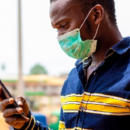Death and Identity in Rwanda – By Richard Dowden

 I don’t know why I keep them, but I have never been able to just throw them away. Two small green folded cards found at a road block in Rwanda in 1994. “Karita Y’Ibiranga Umuntu – Carte d’Indentite Republika y’u Rwanda”.
I don’t know why I keep them, but I have never been able to just throw them away. Two small green folded cards found at a road block in Rwanda in 1994. “Karita Y’Ibiranga Umuntu – Carte d’Indentite Republika y’u Rwanda”.
The name on one is Mugema. Resident of Gatore. No 0422828 Ethnie – Hutu. A boy of 20 with a round head and wearing a neat white shirt stares out.
The name on the other is Gahigi Protais. Resident of Nyirabujali. No 781123 Ethnie – Tutsi. The picture shows a 39-year old man with a long head, large soft eyes and a moustache. A dark brown blood stain has seeped across it.
On the 20th anniversary of the Rwandan genocide people are talking again about “˜tribes’ in Africa. The Hutu “˜Tribe’, the Tutsi “˜Tribe’. But Hutus and Tutsis are not different tribes. That was the point. Tribally – ethnically – they are the same. They lived in the same space on the same hills. They speak the same language, have the same religion, and live within the same culture. The only difference is in appearance and, partly, in occupation.
The (mostly) tall Tutsi were cattle keepers who settled in Rwanda a few centuries ago. The (mostly) shorter Hutu farmers were already cultivating there and they rubbed along together, sometimes complementing each other, sometimes competing but part of the same society, often intermarrying. After more than 200 years many Hutu owned herds of cattle and Tutsis could dig as well as anyone. There is a third group in this part of the world, the Twa, traditionally hunter gatherers, who are the original forest dwellers.
Colonial rule upset the balance. The Germans and then Belgians decided that the Tutsis were superior because they looked more like Europeans and turned them into a ruling class. The Belgians, who are the ones really divided by tribe – into Flemings and Walloons – insisted on elections when they left. The Tutsis with only 15% of the population realised their only chance was dictatorship so they joined the Communist Party and tried to seize power on ideological grounds. They failed and at independence in 1959 many Tutsis were killed or driven out. Those who remained were excluded, marked permanently by their identity cards.
Many of the children of those who were driven out grew up in camps in Uganda where they were also excluded as foreigners. Many joined Yoweri Museveni when he launched his bush war in the1980s and learned to fight as guerrillas. In 1986 they won the war for Museveni but he refused to give them land, so in October 1990 they decided to go home and “liberate” Rwanda. The war stalemated and peace talks and deadlock ensued. On April 6th 1994 President Juvenal Habyarimana was killed when his plane was shot down as it came into land at Kigali airport. It is not known who shot it down but immediately a pre-planned policy of extermination of all Tutsis – and anyone who would not take part in the genocide – was triggered and throughout the entire country right down to village level Hutus turned on their Tutsi neighbours and slaughtered them. If you did not take part you were also killed.
Why did the world not intervene? Two reasons. Firstly because the big event in Africa was the first democratic election in South Africa. All the world’s top journalists were there – not least because they thought the election might turn into a bloodbath. The world’s media could not cope with two stories from Africa at the same time.
Secondly because the Americans had been traumatised by the Blackhawk Down incident in Somalia the previous October when 18 American soldiers were killed in a firefight in Mogadishu. It made the incoming Clinton regime allergic to intervention – especially in Africa. It ensured that the tiny UN force in Kigali at the time was not reinforced and even blocked the sending of unused armoured vehicles to Rwanda. Britain did nothing, having no interest in a former Belgian colony. France continued to support the government even after it was clear that it was driving the planned genocide. Only after several weeks was there a change of policy in Paris.
These were dreadful misreadings of what was happening, at times ignorant, at times understood and callously ignored. It is easy to say it must never happen again but it may happen at any moment, and perhaps already is in Syria, the Central African Republic and north eastern Nigeria, places where an ID card can still carry a death sentence.
Richard Dowden is Director of the Royal African Society and author of Africa; altered states, ordinary miracles. Follow Richard on twitter @DowdenAfrica







Richard, I am rather surprised that an individual like yourself could freely post a statement proven by experts of the region to be utter nonsense.
The (mostly) tall Tutsi…settled in Rwanda a few centuries ago.
This hypothesis was cooked up by colonists trying to explain the science of the day. Eugenicists came up armchair migration theories to account for whatever phenotypic differences they came across. This particular theory has been reiterated by interest parties to justify their racist campaigns against Tutsis in Rwanda and the surrounding region. Perceptions of Tutsis as foreigners was used to kick them out in 1959 and then used again by Habyarimana to block their return.
The notion of Tutsis as outsiders is still prevalent among genocide deniers and perpetrators, so for you to state it here only works to support and amplify claims by those wishing for more pogroms. Regardless of how false it is, people will refer back to you as a credible source when justifying their campaign of hate.